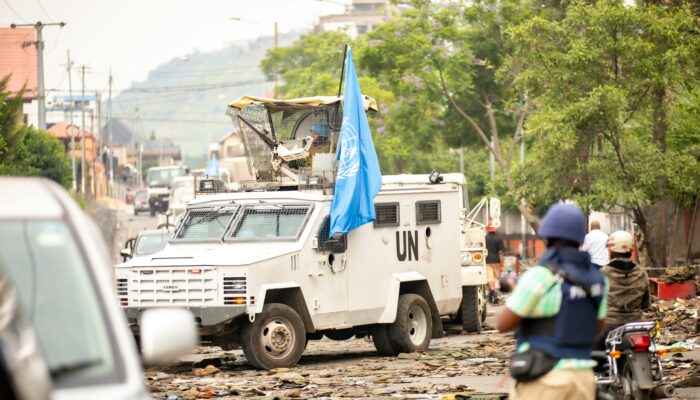Humanitarian panel on UN peacekeeping missions

Picture: MONUSCO. Goma (DRC) by Safi Erneste.
With this session KUNO contributes to the conference of Stichting Nationaal Vrijheidskwartier and Wageningen University & Research.
Please read the report of this event here.
Through keynotes, dialogues, and the panel with NGOs, the speakers will explore the past, present, and future of UN peacekeeping missions—asking what lessons can be learned from recent conflicts and how the Netherlands and the international community might engage in future missions. Dr. Jair van der Lijn will reflect on the evolution of UN peacekeeping missions, while General (ret.) Kees Matthijssen will share views on the future of peacekeeping missions.
Please view the event page for the full day with more information, including the timetable and how to register here.
During the NGO panel, three humanitarian organisations – Save the Children, CARE NL and CIVIC – will reflect on their experience of interacting with past and ongoing UN peacekeeping missions. From a humanitarian perspective, they will share suggestions on the future of UN peacekeeping missions.
Many humanitarian programs interact with UN peace missions, or with the broader UN framework within which peace missions also take place. This raises questions about cooperation and compatibility of objectives, and dilemmas and opportunities that arise. What are the experiences of dealing with conflicting or aligning humanitarian and military dimensions? How do humanitarian actors view the future of peace missions, and the roles of the UN and themselves within that future? These questions become all the more urgent in a time as the present, which sees a substantial rise in defense spending. This panel explores how NGOs reflect on previous or ongoing peacekeeping missions.
A study by Oxfam on UN Peacekeeping missions in CAR, DRC, Mali and South Sudan found that the missions have played a significant role in reducing insecurity and, to an extent, have brought stability. Still, their legitimacy and effectiveness are challenged because of dysfunctions. Communities have sometimes considered peacekeeping missions to be poorly contextualised, lacking sensitivity to the conflict and lacking involvement and consultations with local communities. In addition, some withdrawals were sudden and lacked a proper exit strategy, leaving the region in a vacuum of instability and insecurity among vulnerable groups. But not all peace missions are the same: each mission has its own focus, methods, and mandates, which also evolve over time.
- Wendy MacClinchy, Director of the United Nations program, Center for Civilians in Conflict (CIVIC)
- Kees van de Broek, Advocacy Advisor at CARE Netherlands
- Steven Lanting, Global Advocacy & Lobby Lead, Save the Children
This session is moderated by Corinne Lamain, KUNO coordinator.